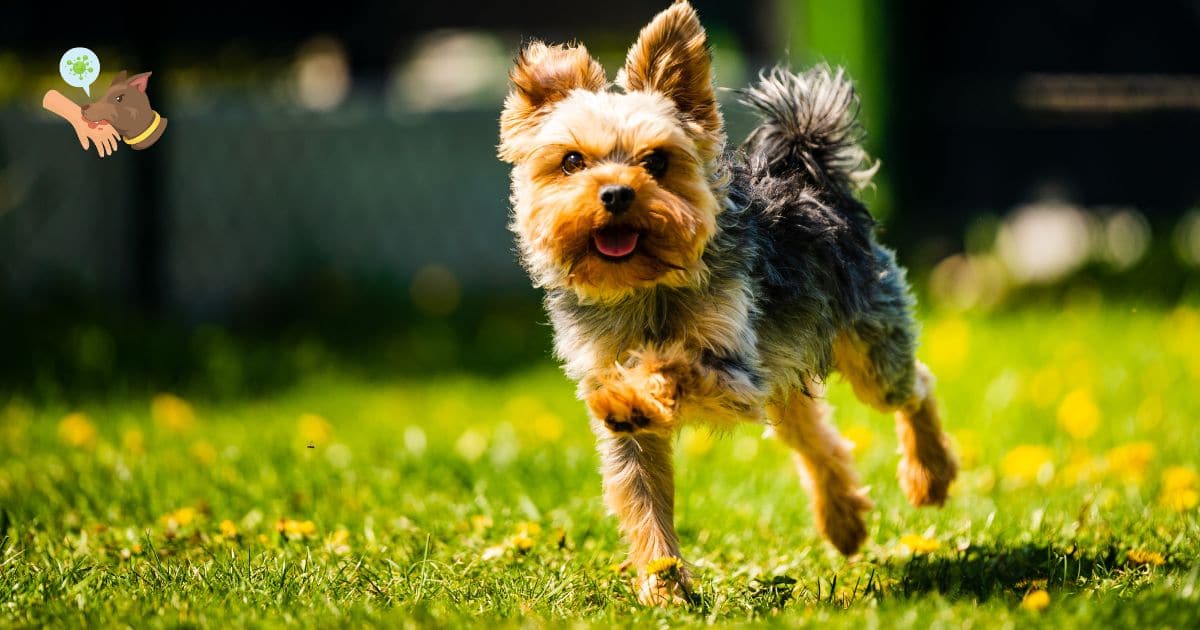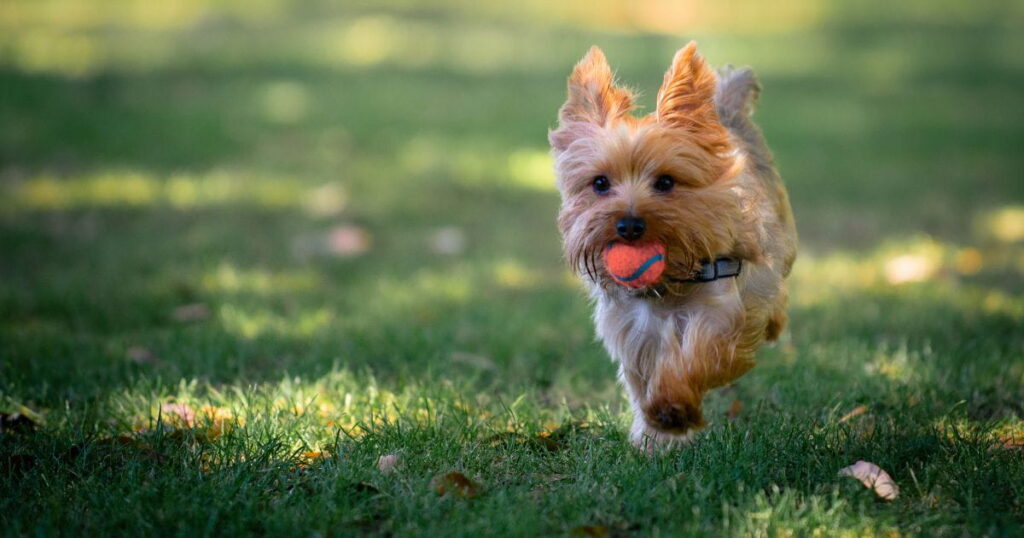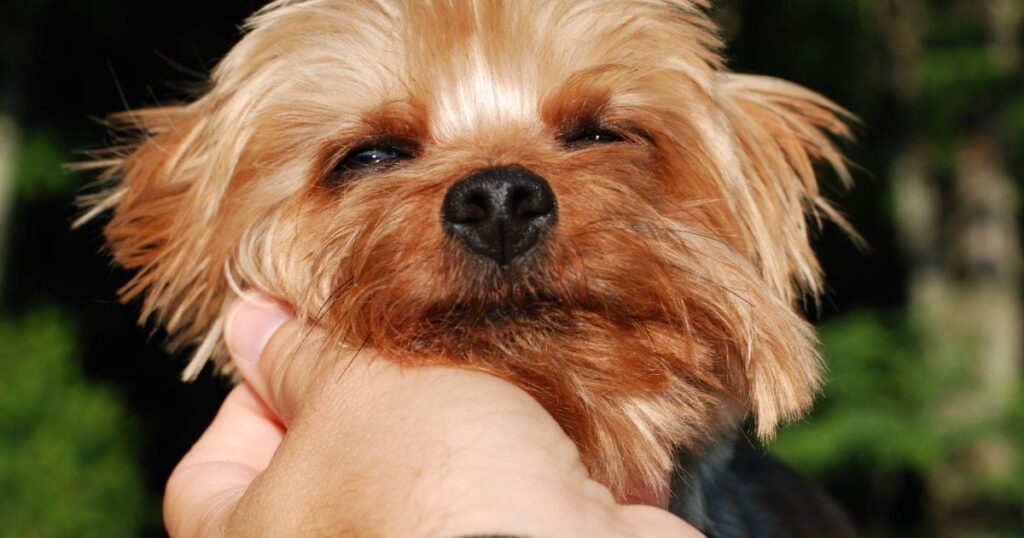Do Yorkies Bite? How to Prevent Aggressive Biting Behavior?

Yes, just like any other dog breed, Yorkies do bite. As responsible Yorkie owners, it’s essential to recognize and address this behavior to ensure a balanced relationship with our furry companions. By understanding the reasons for their biting behavior and implementing proper training, we can effectively prevent and manage this behavior.
Yorkshire Terriers, commonly known as Yorkies, are delightful and affectionate pets. However, they have instincts that can sometimes lead to biting behavior. As owners, it’s crucial to be proactive in dealing with this issue, as it can become a problem if neglected.
To properly handle biting behavior in Yorkies, we need to approach it with patience, knowledge, and gentle behavior. By doing so, we can create a safe and loving environment for both our pets and the people around them.
Why Do Yorkies Bite?
Yorkies, like all dogs, may exhibit biting behavior due to a variety of reasons. Understanding these underlying causes is crucial in effectively addressing and preventing this behavior. The primary reasons are:
- Territorial Instincts: One common reason for Yorkies biting is their strong territorial aggressiveness. These pint-sized pups might feel the need to protect their perceived territory, which can lead to defensive biting. For instance, if a Yorkie sees unfamiliar people or animals approaching their home or favorite spot, they might react by nipping or biting.
- Teething: Just like human babies, Yorkie puppies go through a teething phase. During this period, their gums can become irritated and uncomfortable, leading to increased chewing and biting behavior. Puppies explore the world with their mouths, and this behavior helps relieve their teething discomfort.
- Anxiety and Fear: Yorkies, known for their playful personalities, can also experience anxiety and fear in certain situations. Loud noises, unfamiliar environments, or interactions with larger dogs can trigger anxiety, causing them to bite as a defense mechanism. An anxious Yorkie might choose to bite as a way to protect themselves from perceived threats.
- Playfulness: Yorkies have a playful nature, and biting is a part of their play behavior. Puppies often engage in mouthing and play biting as they interact with their environment and other dogs. While this behavior is usually harmless, it’s important to teach them proper biting restrictions to prevent unintentional harm during play.
- Exploration and Curiosity: Yorkies are curious by nature and may use their mouths to explore objects and textures. This behavior is more common in puppies but can persist in some adult dogs. Biting in this context is not meant to be aggressive but rather a way for them to gather information about their surroundings.

Imagine your Yorkie encounters a new dog at the park. Due to his territorial instincts, he may initially display defensive behaviors such as barking or snapping if he feels his space is being attacked.
Likewise, during the teething phase, he might chew on household items or even clench your fingers to alleviate discomfort. Additionally, if he feels anxious during a thunderstorm, he might bite as a way to cope with his heightened emotions.
By recognizing these reasons for Yorkie biting, we can develop a deeper understanding of our furry companions’ behavior.
Signs of Biting Behavior in Yorkies
It’s crucial to be aware of the subtle cues in Yorkie body language and tiny signals that indicate when they are about to bite. By recognizing biting signs early on, we can take proactive measures to prevent potential incidents. Here are some common signs that indicate a Yorkie might be inclined to bite:
- Growling: Growling is a clear vocal indicator that a Yorkie is feeling threatened or uncomfortable. It’s important to understand that growling is a warning sign that indicates biting. When your Yorkie growls, it’s their way of communicating that they are feeling stressed or anxious. Addressing the underlying cause of their discomfort can help prevent escalation.
- Showing Teeth: Displaying their teeth can be a visual sign of aggression or a defensive pose. If your Yorkie is exposing their teeth, it’s a signal that they may be ready to bite if the perceived threat continues. This behavior is often backed by other defensive postures like raised fur along the back and a tense body.
- Snapping: Snapping is a more immediate warning sign that a Yorkie is having a frightened or angry sensation. It’s a rapid and sudden movement, often intended to warn potential attackers to back off. If your Yorkie snaps, it’s a clear indication that they are feeling threatened and should not be ignored.
- Stiff Body Language: A Yorkie’s body language can reveal a lot about their emotional state. If your furry friend suddenly becomes stiff, tenses up, or freezes in place, it’s a sign that they might be preparing to bite. This stiffness is a sign of increased tension or anxiety and should alert you to the need to step in and resolve the situation.
- Avoidance and Withdrawal: Avoidance and retreat may also be signals of prospective biting behavior, but they are less obvious than the earlier indications. Your Yorkie may be trying to escape from perceived danger or discomfort if they aggressively avoid engagement, hide, or try to leave a place.
Understanding your Yorkie’s temperament and paying attention to their behavior will help you recognize biting behavior. Regularly observe their body language, especially in stressful situations. By noticing subtle shifts in their behavior and reacting appropriately, you can effectively prevent biting incidents.

For instance, if your Yorkie growls when approached by a stranger, it’s essential to give them space and avoid further stressing them. Similarly, if they show their teeth during a play session that’s becoming too intense, it’s time to scale back the activity to prevent potential crises.
By being proactive and attentive, you can create a safe and comfortable environment for your Yorkie, reducing the likelihood of biting and fostering a trusted relationship.
How to Teach Yorkies to Stop Biting?
Training and socialization play crucial roles in shaping a Yorkie’s behavior and preventing undesirable biting tendencies. By promoting positive habits and exposing them to various experiences, we can help our furry companions develop into well-mannered and friendly pets.
Effective training is essential for teaching Yorkies appropriate behaviors and responses. Utilizing positive reinforcement techniques, such as rewards and treats, helps support desirable actions while discouraging negative behaviors like biting. Consistency is key; regular training sessions create a structured routine that fosters a strong bond between you and your Yorkie.

Tips for Positive Reinforcement Training:
- Begin Early: Start training your Yorkie as soon as you bring them home. Puppies are like sponges, eager to learn and adapt to new experiences. By introducing commands and behaviors early on, you create the foundation for a great relationship that lasts a lifetime and promote morals that discourage biting.
- Use Treats: Reward good behavior with treats, verbal praise, and affection. This positive reinforcement encourages them to repeat desirable actions. When they respond appropriately to commands or display actions that show restricted biting behavior, provide immediate positive reinforcement. This encourages them to associate their actions with positive outcomes, motivating them to repeat those behaviors.
- Be Patient: Yorkies, like all dogs, take time to learn and respond. Patience and understanding are crucial during the training process. Avoid becoming frustrated if progress seems slow; each successful attempt is a step towards restraining biting behavior. Your consistent efforts will eventually yield a well-trained Yorkie who has a lower tendency to bite.
- Start with Basic Commands: Teach fundamental commands like “sit,” “stay,” and “leave it.” These commands lay the foundation for more advanced training. When faced with potentially challenging scenarios, such as encountering unfamiliar dogs or people, these basic commands can help divert their focus and reduce the likelihood of aggressive responses.
- Be Consistent: Use consistent commands and cues to avoid confusion. Everyone in the household should use the same commands. Consistent training helps your Yorkie develop a predictable routine, making it easier for them to comprehend and follow expectations.
The Role of Socialization
Socialization exposes Yorkies to a variety of people, animals, and environments, teaching them to interact confidently and calmly. Properly socialized Yorkies are less likely to feel threatened or anxious, reducing the likelihood of defensive biting.
Regular positive interactions during the critical socialization period (between 3 to 14 weeks of age) can greatly influence their behavior.
Socialization Techniques:
- Arrange Puppy Playdates: Arrange playdates with well-mannered dogs to help your Yorkie learn appropriate play behavior and interaction. Through positive interactions with other dogs, your Yorkie learns valuable social cues and communication skills, reducing the likelihood of aggressive responses.
- Introduce to People: Introduce your Yorkie to different people of various ages, sizes, and appearances. This helps them feel at ease around strangers. Expose them to diverse individuals to foster comfort around strangers, minimizing the sense of threat and reducing defensive biting.
- Explore New Environments: Gradually introduce your Yorkie to new environments, such as parks, sidewalks, and pet-friendly stores. This helps reduce anxiety in unfamiliar places. Exposing them to parks, sidewalks, and pet-friendly stores familiarizes them with diverse stimuli, enhancing comfort in new environments and reducing biting habits.
- Establish Positive Experiences: Establish a connection between socialization and positive experiences. Reward your Yorkie for calm and friendly interactions. Rewarding their calm and friendly responses to new people or situations with treats, praise, or affection emphasizes positive interaction with new people or animals and lowers biting tendencies.
By investing time and effort in training and socialization, you lay the foundation for a well-behaved and sociable Yorkie.

How to Handle Biting Behavior Caused by Teething?
Similar to human babies, Yorkie puppies go through a teething phase as their adult teeth begin to emerge. This period typically occurs between three to six months of age and can lead to sore and sensitive gums. As a result, puppies may experience a strong urge to chew and bite to soothe discomfort.
Connection with Biting Behavior
Teething puppies often seek relief by chewing on various objects, including hands, fingers, and household items. While this behavior is natural, it can unintentionally lead to biting if not properly managed. As puppies explore the world through their mouths, their biting tendency may increase during this phase.
Safe and Suitable Teething Solutions:
Provide a variety of teething toys specifically designed for puppies. These toys are made from soft and flexible materials that are gentle on their gums. Teething toys not only offer relief but also redirect their chewing and biting desire away from hands and fingers.
Frozen items such as wet washcloths or special teething rings can offer soothing relief to sore gums. The cold sensation helps numb the discomfort and encourages puppies to chew on appropriate items.
Keep a close eye on your teething Yorkie to ensure they’re not chewing on inappropriate objects. Whenever you catch them engaging in undesirable biting behavior, gently redirect their attention to a teething toy.

Reward your puppy for chewing on appropriate teething toys. By associating these toys with positive experiences, you reinforce the idea that biting on these items is both satisfying and acceptable.
Introduce gentle dental care practices early on, such as brushing their teeth with a soft toothbrush or using puppy-friendly dental chews. Maintaining good oral hygiene can soothe the pain and promote healthy teeth.
By providing your teething Yorkie with safe and suitable toys for their biting needs, you not only address their discomfort but also guide them towards appropriate behavior. With consistent efforts and thoughtful management, you can effectively navigate the teething phase and minimize the impact of biting behavior.
Step-by-Step Methods for Correcting Biting Behavior
Identify Triggers
Begin by identifying the specific triggers that provoke your Yorkie to bite. Observe their behavior and note the situations, people, or environments that contribute to their aggressive responses. Note if you identify triggers like:
- Sudden loud noises
- Approaching strangers
- Being touched during mealtime
- Protecting toys or food
- Unfamiliar dogs or pets
- Feeling threatened
Redirect Attention
When you notice your Yorkie displaying biting behavior, immediately redirect their attention to a more appropriate activity or toy. Offer a teething toy or engage them in a game that encourages play without biting.
Use Commands
Incorporate fundamental commands like “leave it” or “sit” to interfere and redirect your Yorkie’s biting behavior. These commands provide a clear and immediate signal for your Yorkie to stop them from acting aggressively.
As your Yorkie becomes familiar with these commands through consistent training, you’ll develop the skills necessary to promptly stop or prevent biting incidents, promoting safer and more controlled interactions.
Practice Positive Reinforcement
Reward your Yorkie when they behave in a non-biting manner. Offer rewards, kudos, and affection when they obey your instructions, participate in play, or engage in social interactions without biting.

Practice Time-Out Technique
If your Yorkie’s biting behavior persists, implement the time-out technique to clarify the issue effectively. When they show biting habits, calmly and gently withdraw your presence for a brief period. This temporary isolation signifies that their actions lead to a halt in social interaction – a powerful teaching tool.
Over time, your Yorkie will learn to link biting with the interruption of social engagement, encouraging them to rethink their behavior and fostering more controlled and gentle interactions.
Get Professional Training
Seeking guidance from professional dog trainers can provide valuable insights and personalized strategies for addressing biting behavior. Expert trainers can analyze your Yorkie’s behavior, identify underlying causes, and recommend effective training techniques.
Seek Expert Advice from Professional Dog Trainers
According to renowned dog trainers, addressing Yorkies’ biting behavior requires a combination of understanding, patience, and consistency.
Positive reinforcement is a powerful tool in shaping behavior, as it establishes the connection between desired actions and positive outcomes. Trainers emphasize the importance of remaining calm and avoiding aggressive responses when dealing with biting incidents.
Moreover, expert trainers recommend consistent socialization and controlled exposure to triggers to make Yorkies less responsive to potential stressors. By providing controlled and positive experiences, you help your Yorkie build confidence and reduce the likelihood of defensive biting.
Safety Measures
Safety is essential when interacting with Yorkies, particularly those displaying biting tendencies. Understanding how to navigate these interactions can create a secure and balanced environment for both you and your pet.
Tips to keep a secure environment
1. Respect Their Space: Recognize your Yorkie’s boundaries and personal space. Avoid approaching them suddenly or entering their comfort zone, as this can trigger defensive behavior. Allow them to approach you at their own pace.
2. Handle Gently: Always handle your Yorkie with gentleness and care. Use slow and calm movements when picking them up or touching them, minimizing any potential anxiety or discomfort.
3. Avoid Aggressive Play: Avoid harsh or aggressive play that could develop into biting. Choose interactive games that promote bonding without encouraging aggressive behavior.
4. Create Positive Associations: Associate Yorkies with positive experiences. Offer treats, praise, and affection during interactions to create positive associations and reduce any fear or nervousness.
5. Observe Body Language: Learn to interpret your Yorkie’s body language. Recognize signs of discomfort or stress, such as growling, raised fur, or avoidance behaviors. Responding appropriately can prevent escalation.
6. Ensure safety for Children: If children are present, ensure close supervision during interactions. Educate children on gentle handling and proper behavior around dogs to prevent accidental triggers.
7. Get Professional Help: If biting tendencies persist or worsen, seek assistance from a professional dog trainer or behaviorist. Their expertise can provide tailored guidance and strategies for managing and minimizing biting behavior.
8. Regular Medical checkups: Address potential health-related factors contributing to biting behavior by consulting a veterinarian. Pain, illness, or discomfort can influence a Yorkie’s behavior, emphasizing the importance of regular health check-ups.

Why Does My Yorkie Like to Bite My Hands?
Yorkies often bite your hands due to teething discomfort, playful behavior, and seeking social interaction. Teething, which occurs around 3 to 6 months of age, encourages them to chew for relief and help in the loosening of baby teeth. Additionally, their natural energy and playfulness lead them to view hands as toys, leading them to bite or chew.
Biting hands can also be their way of seeking attention and affection from their owners. To address this behavior, redirect them with suitable toys, offer positive reinforcement for non-biting behavior, and establish clear boundaries through consistent training. It’s important to provide appropriate teething toys to relieve pain and consider seeking professional guidance if biting persists or worsens.
Summary
Understanding and addressing Yorkies’ biting behavior is crucial for fostering a harmonious and safe relationship with these playful companions. While Yorkies may choose to bite due to various triggers, including teething, playfulness, and social interaction, effective management and training techniques can significantly control this behavior.
By implementing positive reinforcement, providing appropriate teething solutions, and emphasizing safety measures, Yorkie owners can create an environment that promotes gentle interactions and prevents biting episodes. Remember, responsible ownership, patience, and seeking professional guidance when needed are key elements in ensuring a happy and bite-free companionship with your beloved Yorkie.



